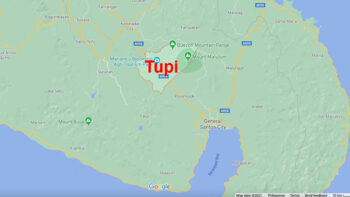Robert Barlis, chief of the Department of Trade and Industry's field service division in Southeastern Mindanao, told MindaNews Thursday that the importer has to comply first with the standard markings for the cement's packaging before it could issue any clearance to allow the impounded cement to be released from the warehouse.
Barlis said the importer would not be given an imported commodity clearance yet for non-compliance to standard marking procedure saying the product label and other information should be printed directly in the cement pack, not in a sticker.
Barlis said the importer would have to go to court to drop the case DTI filed against them for selling the product without the clearance.
He said however, the DTI would issue Philman Commercial Inc. with the imported commodity clearance (ICC) upon the recommendation of the Bureau of Products Standards and once the imported conforms to the required marking, Barlis said.
Barlis said if the results from the test abroad yields that the product failed again, the petitioner could ask the BPS to reconsider its recommendation for the DTI to issue the clearance.
Barlis said the BPS, an attached agency of the DTI, released the results of the test on November 17, the second on the controversial Horse brand cement.
He said the DTI here "saw" the results last Tuesday, a day after the Cement Manufacturers Association of the Philippines (CeMAP) asked the help of Davao City-based news organizations to call on the attention of the regional office of the DTI here “to be transparent” with the results and furnish them with the result of test.
Last Monday, CeMAP was joined by representatives from the Davao City Chamber of Commerce and Industry, Inc. (DCCCII) and the Philippine Product Safety and Quality Foundation, a DTI partner advocacy agency, to express concern on the sale of what they described as “substandard” cement to the integrity of the construction sector using the cement.
Salvador Valbuena, president of the Subdivision and Housing Development Association, also expressed his reservation that it would “defy reason and common experience” if the same DTI-accredited laboratory would issue a passing mark to the cement that earlier failed the test.
“Common experience and reason would tell us that the more the cement is stocked there in the warehouse, it would have already showed deterioration. So if the new samples taken several months after, would now pass the test, it would defy reason,” he said.
The groups have called for an independent test in Singapore to settle the controversy. A total of 118,000 bags of the Horse brand cement were unloaded in the Davao port, but a fourth of the volume have already been illegally sold in local outlets.
But Barlis said the DTI would stand by the integrity of its sampling procedure. He said that the standards test of the cement used random sampling procedure administered by DTI.
Another DTI official, who asked not to be named, said a retest was allowed in the government's standards testing. He said it could happen that a product that failed initial test could pass the retest.
The same official said the DTI would issue the clearance even if some groups have sought more time for an independent test of the cement abroad. "As long as the requirements set in the (BPS) guidelines are met, we will issue the clearance," he said.
